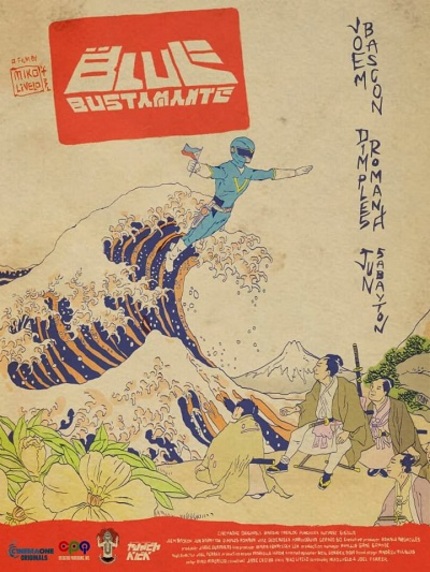CinemaOne 2013 Review: Miko Livelo's BLUE BUSTAMANTE is an Emotionally Affecting Charmer Despite Obvious Rough Edges

Blue Bustamante, Miko Livelo's awkward entry to the depressing genre, is therefore a very welcome breath of fresh air. George (Joem Bascon), Livelo's Japan-bound family man, is not exempt from the trials that usually befall overseas workers. Early on, he is booted from his job as an engineer, and forced to don a mask and a tight body suit to play Blue Force in an ongoing sentai show, just to be able to provide his family back home with comforts. He also becomes a victim of homesickness, relying on the threat-laden letters of his loving wife (Dimples Romana) for company. Despite the very familiar issues, the film never allows itself to wallow in regret and remorse. Instead, it bursts with ingenious energy, reminiscent of the low-budget Japanese television shows it offers itself as a tribute for.
It is thoroughly and enjoyably simple. In fact, its conflict is blatantly trite. Simply put, George is embarrassed of his job, not knowing that his son (Jhiz Deocareza) for whom he sacrifices what remaining dignity he has left for is his character's number one fan. Livelo pads the plot with unsophisticated charm. Humor is abundant, and wit, overflowing. The conversations between George and his glib roommate (Jun Sabayton) are funnily pointless, stretched indefinitely until its perfectly timed punchline.
Livelo surprisingly understands the purpose of his film's comedy. It is its levity. It is its sincerest effort to prevent itself from taking itself seriously and turning into just another of those films that turn modern-day heroes into hapless victims of circumstance. Absent its irreverence, Blue Bustamante is nothing more than a rough-on-the-edges attempt to one-up sentai, which it is obviously not. The blatant imperfections are essential to its charm. Like the kids whose crayon-colored cardboard masks are their greatest tributes to their favorite after-school pastime, Livelo crafts the film to be his grandest compliment to nostalgia.
That is precisely why the film works, despite the obviousness of its low-budget roots, or its inconsistent plotting, or its stubbornness in its straightforward sentimentality. It never complicates the emotions it is trying to pull off. The plentiful sketches and lovely anecdotes on the sentai shows of the past decade are all effective diversions from its immediate heart, which is the father-son relationship that was sadly suspended by distance and lack of communication. When Livelo suddenly strays from his antics and diversions to concentrate on his film's emotional core, it is just impossible not to get affected.
(Cross-published in Lessons from the School of Inattention.)

Do you feel this content is inappropriate or infringes upon your rights? Click here to report it, or see our DMCA policy.






